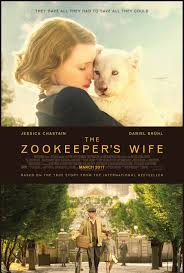The Zookeeper’s Wife
Posted on March 30, 2017 at 3:47 pm
B +| Lowest Recommended Age: | Preschool |
| MPAA Rating: | Rated PG-13 for thematic elements, disturbing images, violence, brief sexuality, nudity and smoking |
| Profanity: | Some strong and bigoted language |
| Alcohol/ Drugs: | Drinking, smoking |
| Violence/ Scariness: | Wartime and holocaust violence involving humans and animals, characters injured and killed, rape of a young girl (off-camera), sexual abuse |
| Diversity Issues: | A theme of the movie |
| Date Released to Theaters: | March 30, 2017 |

Jessica Chastain is luminous in the real-life story of Antonina Zabinski, a Warsaw zookeeper, who, with her husband and son, saved the lives of Jews during the Holocaust. Director Niki Caro (“Whale Rider”) brings her love of the natural world and her gift for telling stories of courage and triumph over bigotry to give us a timely reminder that the direst circumstances can inspire the greatest acts of courage and generosity. It also reminds us that there are still new stories to be discovered, even in a period of history that has inspired hundreds of films and thousands of books.
The movie opens on scenes of Edenic paradise. Antonina looks lovingly at her sleeping son — and at the baby lions sleeping beside him. She leans over and holds his foot, but it is the lion cubs she nuzzles. We then see her opening the zoo for the day, riding her bicycle through the magnificent Belle Epoque zoo, with the young camel loping along behind her, lovingly greeting each of the creatures. We will later learn that she is a refugee from Russia, and her childhood hardships left her more willing to trust animals than people. Animals trust her, too. Her skill at “whispering” even the most frightened and frightening wild thing will prove essential once Germany invades Poland.
Antonina is married to Jan (the Belgian actor Johan Heldenbergh), and the zoo is in every way their home. They live on the premises, but it is more than that. There is no distinction between the rooms they live in and the rest of the zoo. Animals wander in and out of the house and Antonina feels that the animals are her treasured guests — that is the term she uses.
And then Germany invades Poland, and the zoo is destroyed. A German zookeeper, Lutz Heck (Daniel Brühl of “Rush” and “Captain America: Civil War”) offers to take the best of the surviving animals to his zoo in Berlin, promising to care for them and return them after the war. Later, as an officer in the German army, he returns to shoot the animals left behind. The Jews of Warsaw are moved into the Warsaw ghetto. Antonina and Jan figure out a way to smuggle some of them out of the ghetto, and soon they are living in underground cages once used to house animals. Once again, Antonina refers to them as her guests, and each night, after the patrol has gone home, she has music and serves food on elegant trays to remind them that there is still civilization in the midst of madness and kindness and courage in the midst of brutality and terror.
It would be easy to mistake the gentleness of Caro’s approach as not sufficiently harrowing to convey the horrors of the Holocaust, especially after the Oscar-winning “Son of Saul.” But that would be wrong. Caro, who made a film about sexual predation in “North Country,” understands that an unwanted touch of a hand or coming a few millimeters too close can feel soul-destroying, especially when it is misunderstood by someone whose trust and respect mean everything. She understands that a drawing, a bunny, a chance to create, a moment of sympathy can begin to heal a ravaged heart, and she presents Antonina’s story with as much grace and humanity as Antonina showed her guests.
Parents should know that this movie takes place during WWII and the Holocaust, and there are disturbing and violent images including scenes of bombing, the Warsaw uprising, and execution of Jews. A young girl is raped (off-screen) and a woman faces a sexual predator. There is some bigoted language and human and animal characters are injured and killed.
Family discussion: How did Antonina’s love of animals help her in taking care of her “guests?” Why was it important to her to treat her “guests” to gracious entertainment in the evenings? What should she have said to her husband about Heck?
If you like this, try: the book by Diane Ackerman
